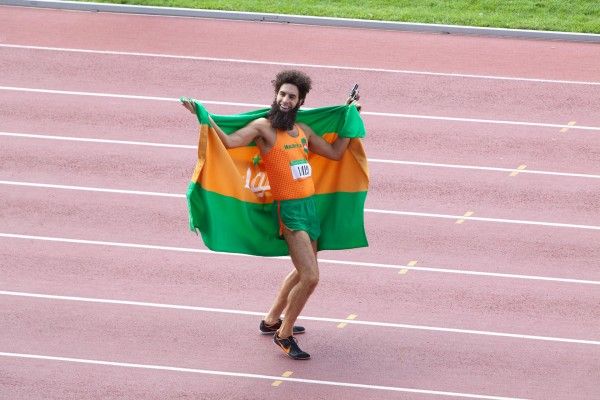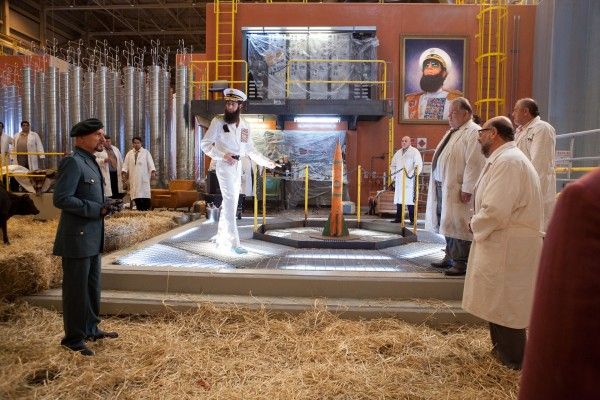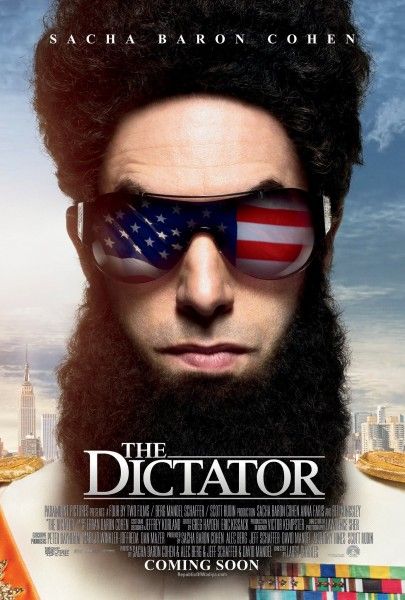Anyone can be offensive. The skill comes with trying to get people to laugh at it. Sacha Baron Cohen, the mind behind the semi-scripted comedies Borat and Bruno, has shown a great skill at getting audiences to laugh at light comic fodder like incest, rape, anti-Semitism, screaming dickholes, and carrying bags of shit to the dinner table. He also tends to throw in a little social criticism for some spice. The Dictator marks his first feature-length, fully-scripted film, and while the blade may be a bit more polished, the edge remains razor-sharp. Despite a slapdash plot and a cop-out ending, The Dictator is brilliantly irreverent, juvenile, cartoonish, and it will have you laughing, feeling guilty about laughing, and then laughing even harder.
Admiral General Aladeen (Cohen), dictator of the Republic of Wadiya, spends most of his days doing all the things that make a dictator generally despised throughout the world: developing weapons of mass destruction, crushing free speech, capriciously ordering executions, etc. However, he adheres to the last request of his father, and refuses to open up his country's oil fields to outside companies, much to the chagrin of his advisor, Tamir (Ben Kingsley). When Aladeen goes to New York City to make an inflammatory speech to the United Nations, Tamir tries to have Aladeen secretly killed and replaced with a double. By sheer dumb luck, Aladeen escapes but without his trademark beard and no other identification, so he's left powerless, and wondering how he'll regain his throne before the double can turn Wadiya into a dreaded democracy, which would allow Tamir to profit from selling the oil fields. Aladeen begins looking for a replacement beard, and starts working for an independent organic health food store so he can gain access to the signing ceremony, but he starts to fall for the store's liberal vegan feminist owner, Zoey (Anna Faris), who doesn't recognize the tyrannical Wadiyan leader without his facial hair.
Cohen's previous comic efforts stand out because not everyone in the film is in on the joke. We suspend our disbelief not only by accepting the character and the premise, but we also stare in astonishment at the unwitting participants who echo the dubious virtues of Cohen's fictional characters. The Dictator removes the distraction of trying to figure out who's being conned, and gives Cohen a comic diversity he hasn't had in his previous films. The offensive humor is still the baseline, but he now has more ways to pull it off. Aladeen can still make a joke about sexually traumatizing the boys of Menudo, but now that kind of joke can lead to a delightful banter between Cohen and co-star Jason Mantzoukas, who plays a refugee Wadiyan nuclear scientist who decides to help his leader. The script also allows the film to be at turns cartoony, witty, weird, and satirical, and Cohen and director Larry Charles no longer have to cater to the mockumentary form. They can still make insane gross-out gags, and audiences can decide if they find The Dictator's special-effect set-ups more repulsive than the horrifically (and hilariously) real naked wrestling fight between Cohen and Ken Davitian in Borat.
In many ways, The Dictator is Borat in better clothes. Both movies feature protagonists who come from third-world countries (the fictional Wadiya is in North Africa), and their environment has led to the characters holding backwards, deeply-offensive values. However, both characters are (theoretically) execused because they come from a place of ignorance, and ultimately Borat and Aladeen just wanted to be loved. These attempts at redemption are fascinating because they play to our desire to not feel absolutely rotten after having laughed at jokes involving pedophilia and 9/11. If we can forgive Borat and Aladeen, we can try to forgive ourselves.
But should we forgive Cohen's creations? We can accept a happy ending for Borat since his stupidity is accompanied by humility. For Borat, a character who's proud of his VCR, it's completely natural for his poor village to have a "town rapist" as if it were a positive contribution to any community. But Aladeen is the rapist. He operates from the same place of supreme ignorance crafted by cultural circumstances, but he's still a murderous, power-mad, despicable human being. And yet, like he's done in his previous films, Cohen is really shining a light on our beliefs. Borat goes the direct route by having its eponymous character interview unwitting subjects, and having those subjects speak to the American character. The Dictator has to put that social critique in the subtext by trying to remind us how we desensitize ourselves to horrible leaders by paying attention to their eccentricities. The movie opens with a dedication to the recently deceased North Korean dictator, Kim Jong-il. Jong-il was a brutal tyrant, but we laughed him off because he never managed to hurt any nation other than his own, and he looked funny. The Dictator simply exaggerates an absurdity we've already accepted, and since we all don't work for Amnesty International, why should we draw the line at the crimes of a fictional character?
Because everything is tightly-scripted and there's no comic burden on unsuspecting subjects, The Dictator comes off as almost aggressively offensive. However, the ease and confidence of the jokes rarely call attention to the content. If anything, the movie constantly highlights how desensitized we've become to things that should cause offense. If Steven Spielberg can use the massacre of Israeli athletes at the 1972 Munich Olympics as Oscar-bait, then why can't Cohen and Co. use it as material for Aladeen's personalized Nintendo Wii game? One can argue that Spielberg is being more "respectful", but he's still moving a tragedy through the same studio mechanism as The Dictator. At least Cohen's film is more entertaining.
Strangely, for all the jokes made at the expense of minorities and tragedies, The Dictator has a glass jaw. The ending fails to reconcile the monstrous acts of Aladeen with his newfound "humility". The film ends up torn between the brilliant dark comedy of the previous 75 minutes and trying to leave audiences on an uplifting note. Cohen never wants us to feel conflicted about Aladeen, and his performance goes a long way in helping us feel sympathy towards the character. However, Cohen is incredibly reluctant in having Aladeen grow because doing so would fundamentally change what makes the character absurd. If Aladeen becomes kind and understanding and sheds off his authoritarian ways, then he's not funny anymore. It's bizarre that the movie can be a crowd-pleaser by making jokes about rape centers, but it's too timid to buck the convention of a transformative arc.
As long as it stays away from timid compromise, The Dictator is a deliciously bad-taste comedy. I saw the film almost a week ago and I'm still chuckling when I think back on some of the jokes. Shock value dissipates quickly, but The Dictator never uses offense as an end unto itself. It's always used in the service of gross-out humor, playful banter, cartoony situations, and joyous absurdity. The material may be offensive, but viewers can't feel too offended when they're laughing so damn hard.
Rating: B+





